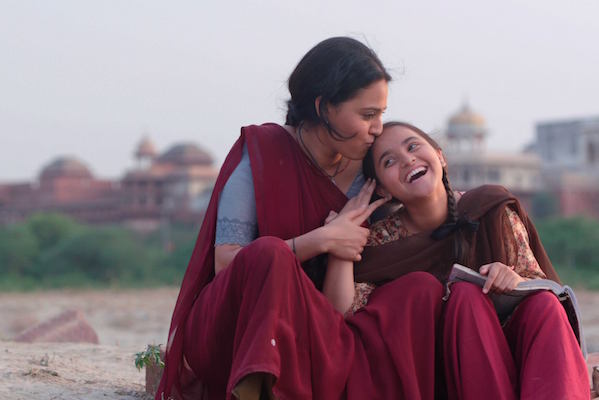My identity as an actor hasn’t been built on lead roles – Swara
Swara Bhaskar has won many a hearts with her acting in films like Tanu Weds Manu, Raanjhanaa and more recently Prem Ratan Dhan Payo. An outsider to the industry, she has made her presence felt in supporting yet powerful roles that have been central to the plot. Her latest, Nil Battey Sannata is a heartwarming tale of a mother from a lower-caste of the society, who pushes her child to achieve more than she ever could. The film that has been well-received at various films festivals also got Swara the Best Actress award at the Silk Road International Film Festival in China.
Here are some excerpts from an interview with the talented actress, where she at her upfront best talks about her journey with Nil Battey Sannata and the choices that she has made as an actor.

Swara Bhaskar
To begin with, what is the meaning of the film’s title ‘Nil Battey Sannata’?
Nil is an English word that means nothing. Battey means ‘division or divided by’ in Hindi. Sannata is also symbolic of nothing. So, ‘Nil Battey Sannata’ means zero divided by zero. It is a common term used in North India that refers to a person who is a hopeless case in life. However the story of the film is not ‘Nil Battey Sannata.’ It is a heartwarming tale of a woman named Chanda who works as a servant in people’s houses. She has a stubborn daughter, Apu, who is actually a ‘nil battey sannata.’ She has no qualms about life and her world only revolves around Ranbir Kapoor, Salman Khan and Bollywood. Her life’s philosophy is that this being India, here a politician’s son will be a politician, a doctor’s son will be a doctor, and hence a servant’s daughter will be a servant.
But Chanda gets disheartened when she learns this. The story is about Chanda’s struggle to ensure that her child doesn’t endure the same hardships that she had to face. It is a very simple, yet relatable story. Everybody has experienced this story in some form or another. Two experiences are universal in life – being scolded by your parents and worrying about your kids. Whoever watches this film will relate to it based on these experiences.
READ: NIL BATTEY SANNATA WINS APPLAUSE AT BFI LONDON FILM FESTIVAL 2015
You play a mother in the film. Were you apprehensive of taking up this role at such an early stage in your career?
[Laughs] I am a fool. I like doing such dangerous stunts with my career like becoming Salman Khan’s sister and playing a mother. When Ashwini (Iyer Tiwari, Director) offered me the role, I was taken aback. I thought, “I am such a young girl, I cannot be playing a mother onscreen yet.” So I started reading the script with the intention of rejecting it eventually. But, I was sold as soon as I finished reading it. I consulted some friends on whether I should pick the movie or not. They were like, “Swara, if you want to do a career suicide, then do the film!” But then I reasoned with myself on two factors. Firstly, even if an actor fails in a challenging role, the actor still grows in his/her craft. It is always easier to do a role which is younger than one’s real age. That is because it is easier to relate to it.
But I wouldn’t know how a mother of a fifteen-year-old would feel or react in a situation. For an actor, that is beautifully challenging. There is no way I could let it go! If I were offered the role of a man in the future, I would literally jump at the opportunity. And secondly, no decision can be taken with fear. If I was fearful about the outcome of every decision that I ever took, I probably would never have been here in Mumbai, where I had no producer, friend or boyfriend as a support in the industry. And now that I am here, I might as well make the most of it.
Even if an actor fails in a challenging role, the actor still grows in his/her craft
How did you get into the skin of playing a mother and also acquire the accent for the character?
My career has been based out of roles in UP and Bihar only [Laughs] Since this role was based in Agra, that is western UP, the dialect had to be Awadhi. I befriended many domestic helpers and bais in Agra to get the nuances of my character. A lot of the words in my dialogues have been picked up from them. I even bought a pair of slippers from the Agra market, and would walk in them everyday, in the hope to spiritually connect with my character [Laughs] I got my dialogues read by my bai in Bombay, who was from UP. She used to call her kids lalla and lalli and I picked those words from her. Meanwhile, Ashwini had instructed me to put on ten kilos of weight, which I had a hard time to lose after the shooting was completed. Ashwini then asked me how I was going to prep for my role as a mother, to which I replied that I was showing motherly love to the puppies at my home. [Laughs] Of course, she didn’t buy that.
So I called and interviewed my own mother, and recorded everything. That was very eye-opening. I learnt of all the times that I had troubled her. But it was also very interesting. It gave me an insight into how the mother of a teenage girl feels and reacts. I realised that when you love your child so much, your greatest emotion other than love is the fear of losing your child. That was a revelation. I used this in my character. Even when Chanda’s child is rude and offensive to her, she just cannot abandon her hope for her child. Motherly love is unconditional.
There is so much anxiety regarding age when it comes to being an actress. You have to portray yourself in a particular younger image. You have to be mindful of revealing your true age, grey hair, and then there are issues of getting married and having kids with respect to your career. But this role taught me that even if you are a certain age in your life, especially that of a mother, you are still interesting enough to have a story made on you. This changed my psychology.
READ: HOW INDIAN ACTORS GO THE EXTRA MILE PREPARING FOR THEIR ROLES

Still from Nil Battey Sannata
How would you describe Ashwiny as a director? What was her brief to you?
Ashwiny has a great instinct. It was my first time with a female director and she was superb. As a director, she has a great sense of aesthetic. I was once complaining that our DOP and she had unnecessarily beautified poverty in the film. It all looks very scenic. For instance, in a particular scene that lasted not more than ten seconds, and came twice in the film, we had to shoot at a dhobi ghat. This dhobi ghat at the banks of the Yamuna was very dirty. The washermen themselves wore gloves and gum boots. We shot there for six hours in the blazing sun, just to get the right shot for the ten second sequence. But the frame looked good. When you are working with a male director, there is a different equation. You have to be careful that you don’t come across as flirty or dominating. But with a female director, there is no scope for such misunderstandings. It is a beautiful equation. I am very happy that I discovered Ashwini.
For the first time, I have a film that is resting on my shoulders and I have a huge studio backing it
Talking about your past films like Raanjhana and Tanu Weds Manu, you have made your presence felt in small yet powerful roles. But does lesser screen space ever bother you?
I can’t control the work that I am offered. What I can do is pick the best. That is also a gamble because you never know how a script that sounds good will actually turn out and fare at the box-office. But that is a risk that actors have to take. We actors are ready to audition, but it is the director’s call whether he considers us for the audition or not. That is an act of fate.
But I have been lucky because even when it comes to commercial cinema, where I have had relatively smaller roles, I have received my fair share of praise and acknowledgement. For example, my character Bindiya in Raanjhanaa won me rave reviews. None of my roles got cut or snipped and they were all essential to the plot. My identity as an actor hasn’t been built on lead roles. When people ask me to click selfies with them, it is not because of my work in films like Machhli Jal Ki Rani Hai or Listen… Amaya. It is because of my supporting roles in Raanjhana and Prem Ratan Dhan Payo. The supporting roles that I did were blockbusters, and my lead roles did not do so well because they were independent releases.
Independent releases are a big risk. Even if you put in a lot of money, the distributor-exhibitor nexus has to be broken. I am excited about Nil Battey Sannata because for the first time, I have a film that is resting on my shoulders and I have a huge studio backing it. My film is going to get a fair chance in terms of reaching the audience.
READ: NIL BATTEY SANNATA TO HAVE HINDI AND TAMIL VERSION

Swara (Centre) at the 2nd Silk Road International Film Festival
So would you say that commercial films make an actor a star?
Commercial films ensure longevity of the actor. Not as many people remember me for Listen… Amaya as they do for other films. But having said that, the definition of commercial films is also dissolving. Take the case of films like NH10, Queen, Neerja, Mardaani, Mary Kom, and you can also add Nil Battey Sannata to the list. Commercial films are striving to not look commercial anymore and the definition of a ‘commercial’ film is changing for Bollywood.
But, Ashwiny thinks that Nil Battey Sannata is a commercial film because it has comedy and emotions. As a strategy I feel that every Prem Ratan Dhan Payo that I did has given me five hundred tickets for Nil Battey Sannata, and every Raanjhanaa that I did will give me eight hundred tickets for my next film, Anarkali Aaraawali. It is not my nobility, but rather I have no choice. I have to do this if I want a long career in Bollywood. One has to manage their commercial space as an actor.
Commercial films are striving to not look commercial anymore
Nil Battey Sannata has received rave reviews at film festivals abroad. What are your expectations from the film in India?
I hope it does really well in India and makes a lot of money. Every Nil Battey Sannata that becomes a super hit will encourage five more Nil Battey Sannatas to come up in the next two years.
Coming from a non-film background, have you ever signed a film only for survival?
I have been lucky to be getting the kind of work that I have done. I have never done a film for money. Money can always be borrow from my parents or somebody else. A film stays forever in the National Archives. When I am in the grave, I want to have a respectable body of work. I don’t want to seem like a jackass who just randomly did work.
-Transcribed by Shikhar Goyal



